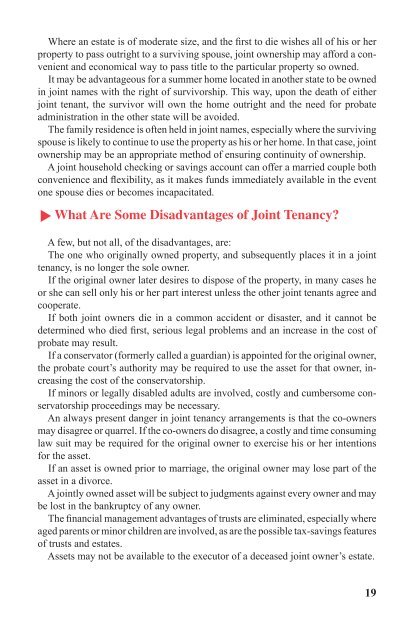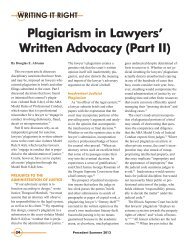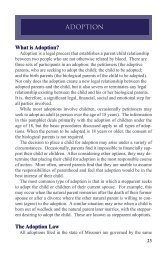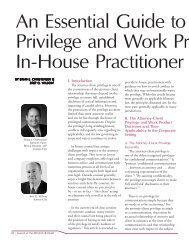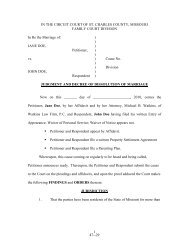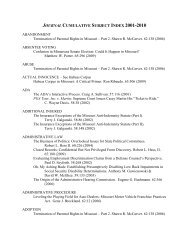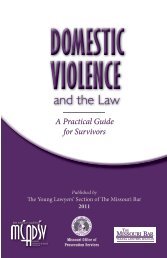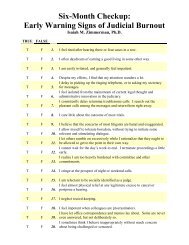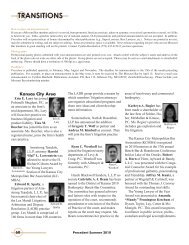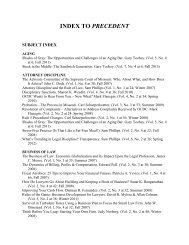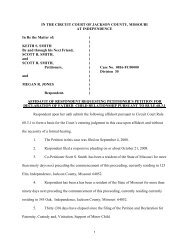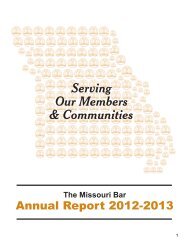Probate Law Resource Guide (PDF) - the Missouri Bar
Probate Law Resource Guide (PDF) - the Missouri Bar
Probate Law Resource Guide (PDF) - the Missouri Bar
- No tags were found...
You also want an ePaper? Increase the reach of your titles
YUMPU automatically turns print PDFs into web optimized ePapers that Google loves.
Where an estate is of moderate size, and <strong>the</strong> first to die wishes all of his or her<br />
property to pass outright to a surviving spouse, joint ownership may afford a convenient<br />
and economical way to pass title to <strong>the</strong> particular property so owned.<br />
It may be advantageous for a summer home located in ano<strong>the</strong>r state to be owned<br />
in joint names with <strong>the</strong> right of survivorship. This way, upon <strong>the</strong> death of ei<strong>the</strong>r<br />
joint tenant, <strong>the</strong> survivor will own <strong>the</strong> home outright and <strong>the</strong> need for probate<br />
administration in <strong>the</strong> o<strong>the</strong>r state will be avoided.<br />
The family residence is often held in joint names, especially where <strong>the</strong> surviving<br />
spouse is likely to continue to use <strong>the</strong> property as his or her home. In that case, joint<br />
ownership may be an appropriate method of ensuring continuity of ownership.<br />
A joint household checking or savings account can offer a married couple both<br />
convenience and flexibility, as it makes funds immediately available in <strong>the</strong> event<br />
one spouse dies or becomes incapacitated.<br />
▼<br />
What Are Some Disadvantages of Joint Tenancy<br />
A few, but not all, of <strong>the</strong> disadvantages, are:<br />
The one who originally owned property, and subsequently places it in a joint<br />
tenancy, is no longer <strong>the</strong> sole owner.<br />
If <strong>the</strong> original owner later desires to dispose of <strong>the</strong> property, in many cases he<br />
or she can sell only his or her part interest unless <strong>the</strong> o<strong>the</strong>r joint tenants agree and<br />
cooperate.<br />
If both joint owners die in a common accident or disaster, and it cannot be<br />
determined who died first, serious legal problems and an increase in <strong>the</strong> cost of<br />
probate may result.<br />
If a conservator (formerly called a guardian) is appointed for <strong>the</strong> original owner,<br />
<strong>the</strong> probate court’s authority may be required to use <strong>the</strong> asset for that owner, increasing<br />
<strong>the</strong> cost of <strong>the</strong> conservatorship.<br />
If minors or legally disabled adults are involved, costly and cumbersome conservatorship<br />
proceedings may be necessary.<br />
An always present danger in joint tenancy arrangements is that <strong>the</strong> co-owners<br />
may disagree or quarrel. If <strong>the</strong> co-owners do disagree, a costly and time consuming<br />
law suit may be required for <strong>the</strong> original owner to exercise his or her intentions<br />
for <strong>the</strong> asset.<br />
If an asset is owned prior to marriage, <strong>the</strong> original owner may lose part of <strong>the</strong><br />
asset in a divorce.<br />
A jointly owned asset will be subject to judgments against every owner and may<br />
be lost in <strong>the</strong> bankruptcy of any owner.<br />
The financial management advantages of trusts are eliminated, especially where<br />
aged parents or minor children are involved, as are <strong>the</strong> possible tax-savings features<br />
of trusts and estates.<br />
Assets may not be available to <strong>the</strong> executor of a deceased joint owner’s estate.<br />
1119


